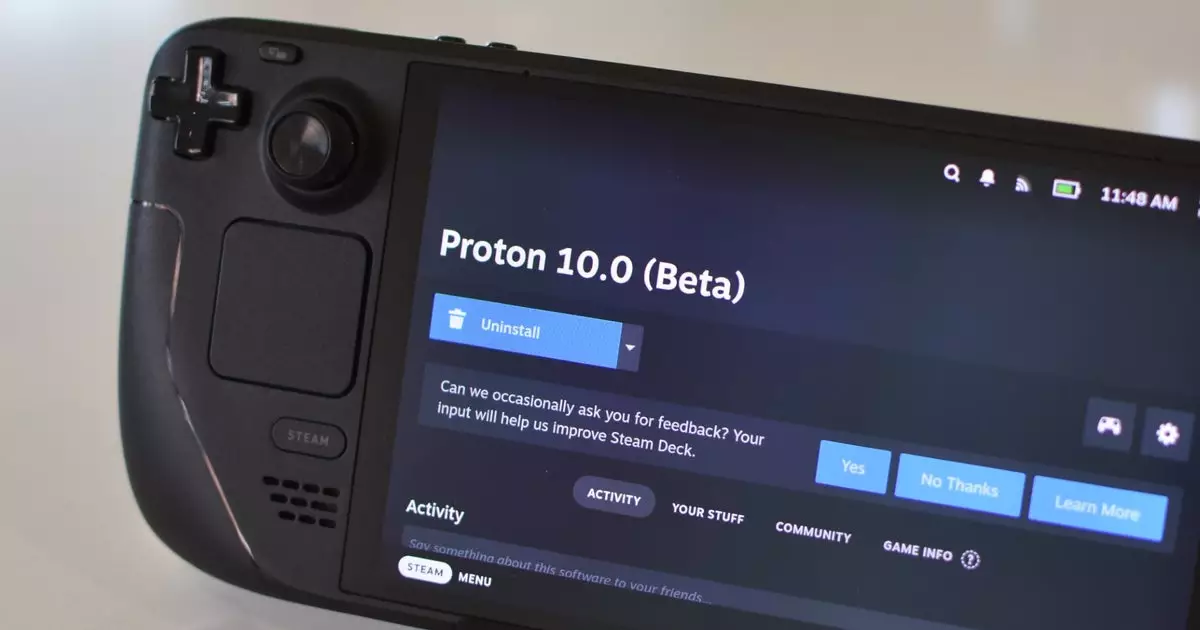For Linux gamers, the recent announcement of Proton 10.0’s beta release is monumental, marking a pivotal moment in compatibility between Windows games and Linux platforms. This collaborative effort between Valve and CodeWeavers has provided a lifeline to countless titles that many believed would remain forever locked in the Windows ecosystem. After nearly a year of waiting, the availability of this milestone update is not just a technical improvement; it embodies a commitment to inclusivity in gaming, allowing gamers to enjoy a broader selection of titles without the hassle of dual-booting or using cumbersome workarounds.
Compatibility: A New Hope for Titles Previously Unsupported
One of the most exciting features of Proton 10.0 is the significant expansion of supported games. With updates that target specific titles such as “Assassin’s Creed Shadows” and “Grand Theft Auto V Enhanced,” it is evident that Valve and CodeWeavers are laser-focused on enhancing the gaming experience. Notably, even demanding titles like “Microsoft Flight Simulator 2024” and “Batman: Arkham Asylum Game of the Year Edition,” which were previously deemed unsupported on the Steam Deck, are now poised for compatibility. This is a game-changing development that could transform how Linux gamers perceive their options, potentially giving rise to an entirely new wave of players eager to explore these titles.
Implications for Gaming on the Steam Deck and Beyond
The Steam Deck is the darling of the handheld gaming world, uniting diverse gaming experiences on a handheld device. With Proton 10.0’s updates, the library of compatible games is expanding tantalizingly, and the implications are profound. The recent successful runs of titles like “Arkham Asylum” suggest that players can now enjoy a seamless experience across an increased number of games. Not only does this strengthen the Steam Deck’s position in an increasingly competitive market, but it also boosts the morale of the Linux gaming community, who often advocate for open-source software and user autonomy.
Furthermore, this transition is not limited to just the Steam Deck; Linux desktop users are also set to benefit. Compatibility fixes related to performance problems with Intel GPUs will provide a broader and smoother experience across numerous systems. The recognition that Linux desktop users also deserve attention is a refreshing reminder that the gaming landscape is increasingly inclusive and considerate of various user needs.
Betas, Experimental Builds, and the Open-Source Advantage
Proton’s journey has not been devoid of bumps along the way. The history of compatibility has often led to reliance on alternative solutions such as Proton GE, a community-driven version that has provided experimental features and fixes. While Proton GE is undoubtedly innovative, it has also required users to navigate the complexities of desktop mode alterations on the Steam Deck, presenting a barrier to entry for less tech-savvy users. Proton 10.0, however, promises a more streamlined experience by offering a fully polished beta that doesn’t necessitate these complex adjustments, making the gamer’s transition from Windows to Linux that much smoother.
What we see here is a clear distinction between the community’s necessity for experimental builds and the official, more stable experience Valve aims to deliver with Proton’s mainstream updates. Gamers now have the opportunity to access these beta versions directly from their Steam library, ensuring that they can explore new compatibilities without the intricacies of advanced setups—a significant step towards accessibility in gaming.
A Bright Future for Linux Gaming
Proton 10.0 is a necessary evolution for Linux gaming, and as the beta receives more attention, we collectively anticipate the stable release with bated breath. This update not only fills critical gaps in compatibility but also showcases the dedication of developers behind the scenes who strive to make gaming more inclusive. The thoughtfully targeted improvements suggest a keen understanding of what gamers want and deserve, breathing new life into titles that were previously unplayable for many users.
Moreover, as more gamers adopt Proton as their tool of choice for bridging the gap between Windows and Linux gaming, we could see a significant shift in the community landscape. With increasing user input and feedback, future updates are likely to become not just improvements in software but also enhanced engagements with the community itself, further solidifying Proton’s place as a cornerstone of the Linux gaming ecosystem.


Leave a Reply